Jeg hørte en gang noen si at blogging bare er en hobby for de som er godt bevandret i engelsk.
Min reaksjon? Nei, det fungerer ikke slik.
Blogging er en vanskelig virksomhet. 73% markedsførere betrakte det som en strategi for å generere potensielle kunder.
Likevel tror mange at blogger bare handler om å skrive. Ikke mer, ikke mindre. Det får meg til å lure på om verden i det hele tatt vet hva en blogg er?
Det er ikke noe du kan behandle som en hobby. Det er et verktøy som bedrifter har brukt for å skape større merkevarebevissthet, tiltrekke seg nye kunder og generere mer inntekter.
La oss lære mer om blogger i denne... vel, bloggen.
Det viktigste å ta med seg
- En blogg er bare et sted hvor du deler det du vet eller mener om noe. Det er din måte å snakke med folk på nettet med din egen stemme.
- Jo mer nyttig og ærlig teksten din er, desto flere leser den, stoler på den og kommer tilbake for mer. Slik fungerer blogging egentlig.
- Hver blogg ser litt forskjellig ut, men målet er det samme. Det vil si å gjøre det enkelt for leserne å finne det de trenger og knytte seg til det du sier.
- Enten det er personlig, forretningsrelatert eller nisjefokusert, kommer de beste bloggene fra skribenter som vet hvorfor de gjør det.
- Blogging krever tålmodighet, men hvis du er ærlig og konsekvent, kan det med tiden vokse til noe meningsfullt, og til og med lønnsomt.
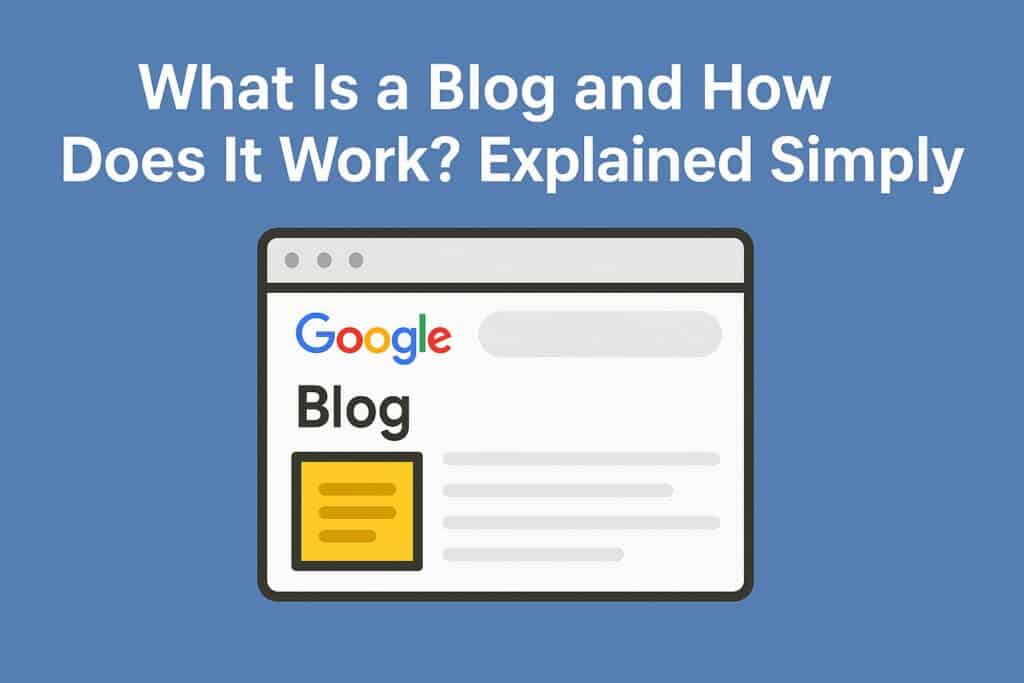
Hva er en blogg? (Enkel definisjon)
La oss først få én ting på det rene. En blogg er ikke en digital dagbok hvor folk skriver om hverdagen sin, selv om det var slik det var før i tiden.
Det er et internettforum hvor enkeltpersoner deler sine ideer, ekspertise og innsikt.
En blogg er en nettside (eller en del av en). Denne nettsiden oppdateres jevnlig med nytt innhold, også kalt blogginnlegg.


Aldri bekymre deg for at AI oppdager tekstene dine igjen. Undetectable AI Kan hjelpe deg:
- Få AI-assistert skriving til å vises ...menneskelignende.
- Bypass alle de viktigste AI-deteksjonsverktøyene med bare ett klikk.
- Bruk AI trygt og selvsikkert i skole og arbeid.
Jeg vet hva du tenker.
Hva er et blogginnlegg, og hvordan skiller det seg fra artikler eller rapporter? Begge finnes jo på internett, ikke sant?
Blogginnlegg er mer personlige og uformelle enn formelle artikler eller rapporter. De har som mål å informere, engasjere og skape kontakt med leserne.
De fleste blogger fokuserer på et bestemt tema. Hvert innlegg svarer på et spørsmål, løser et problem eller deler et perspektiv som er viktig for leserne.
Men det som virkelig definerer en blogg, er dens stemme. I motsetning til statiske nettsteder som bare fortelle ting, blogger snakke til deg.
Det er derfor du ser kommentarfelt, delinger på sosiale medier og nyhetsbrev knyttet til noen blogger.
Hvordan en blogg fungerer
Hva er en blogg og hvordan fungerer den? Vi kjenner definisjonen, la oss nå se nærmere på den andre delen.
En blogg kjører i en sløyfe.
Du skriver noe nyttig → folk finner det → de leser det → de stoler på deg → de kommer tilbake for mer.
Det er alt. Jo mer verdi du gir, jo flere mennesker blir værende.
Strukturen til en blogg
Blogger følger vanligvis ikke et strengt mønster, men de fleste av dem har samme grunnleggende struktur.
- En hjemmeside — hvor nye eller utvalgte innlegg vises.
- Enkeltinnlegg — hver med fokus på ett hovedtema eller spørsmål.
- Kategorier og tagger — de hjelper til med å holde orden på ting.
- En Om-side — forteller leserne hvem du er og hvorfor bloggen din eksisterer.
- En kontakt-side — for når folk faktisk ønsker å nå deg.
Alt annet, som sidefelt, popup-vinduer eller registreringsskjemaer, er bare ekstra. Målet er bare å gjøre det enkelt for leserne å finne det de kom for og bli lenge nok til å bry seg.
Strukturen jeg har forklart her, gjelder en uavhengig bloggside. En bedriftsblogg er noe annet.
En bedriftsblogg er en seksjon på et nettsted hvor blogger publiseres.
Formålet med en blogg
En blogg uten formål er bare ord på en skjerm.
Hvorfor Skriver du?
Noen blogger for å dele det de har lært. Andre gjør det for å markedsføre virksomheten sin. Noen trenger bare et kreativt utløp.
Uansett årsak er en blogg et middel til å komme i kontakt med mennesker.
Hvis du driver en bedrift, hjelper bloggen deg med å nå riktig målgruppe, bygge tillit og sakte omdanne den tilliten til handling.
Hvis du skriver personlig, gir en blogg deg en mulighet til å dele dine synspunkter og finne folk som forstår deg.
Kort historie om blogging

Man skulle tro at blogging er et ganske nytt konsept, men det startet allerede tidlig på 1990-tallet.
Ja, omtrent samtidig som internett ble allment tilgjengelig.
Folk begynte å bruke nettsider til å dele sine tanker og hverdagsliv, og behandlet dem i praksis som en erstatning for dagbøker.
Det fantes ingen fancy plattformer den gang, bare ren tekst på statiske sider.
I 1997 kom en mann ved navn Jorn Barger på begrepet “weblog” for å beskrive denne nye vanen med å “logge nettet”.”
Et par år senere, i 1999, forkortet Peter Merholz spøkefullt "weblogg" til “vi blogger” og ordet “blogg” fast. Kort tid etter kom verktøy som Blogger og LiveJournal gjorde det enkelt for alle å begynne å skrive på nettet.
På begynnelsen av 2000-tallet hadde blogger utviklet seg til å bli mer enn bare personlige dagbøker. De ble arenaer for nyhetsoppdateringer, anmeldelser, aktivisme og profesjonell skriving.
Denne eksplosjonen av blogger på internett ble kalt “blogosfæren”.”
I dag er blogging en del av den vanlige forretnings- og mediestrategien.
Mange kjente nettpublikasjoner startet faktisk som blogger før de vokste til fullverdige merkevarer.
Typer blogger
Hver blogg starter med en grunn. Noen blogger for å uttrykke seg selv, andre for å promotere noe større.
Personlige blogger
Hva er det første du tenker på når jeg spør deg hva en personlig blogg er? Noen sa en gang at det er når folk holder bloggene sine private. Det er det morsomste jeg noensinne har hørt.
En personlig blogg er når folk skriver om sine liv, ideer og erfaringer.
Det føles som en samtale mellom venner. Det er ingen merkevarestrategi eller markedsføringsplan.
Disse bloggene handler bare om vanlige temaer som familieliv, hobbyer eller reiser.
Forretningsblogger
En bedriftsblogg er litt mer strategisk. Den er en del av merkevarens markedsføringsplan og behandles som et middel for å tiltrekke potensielle kunder.
Du har sikkert sett merkevarer som publiserer blogginnlegg med titler som “10 måter å øke produktiviteten din på” eller “Hvordan velge riktig forsikringsplan”.”
Det er en taktikk å tilby verdi som lokker leserne, bygger troverdighet og veileder dem mot å gjøre forretninger med det merket.
Profesjonelle blogger og tilknyttede blogger
Profesjonelle blogger er laget for å tjene penger på å skrive. Disse bloggerne utvider publikummet sitt, inngår samarbeid med merkevarer eller viser annonser for å tjene penger.
Affiliate-blogger faller inn under samme kategori. De anbefaler produkter eller tjenester, og når leserne kjøper via linkene deres, tjener bloggeren en liten provisjon.
Nisjeblogger
Nisje Blogger fokuserer på bare ett bestemt tema. De skriver ikke om alt mellom himmel og jord, men utforsker bare ett enkelt tema.
Disse bloggene fungerer fordi de tiltrekker seg et engasjert publikum som virkelig bryr seg om det aktuelle temaet.
Nyheter eller medieblogger
Nyhetsblogger dekker nye trender, hendelser eller historier fra hele verden.
De er mindre formelle enn aviser, men prøver likevel å holde leserne informert.
Hvorfor starte en blogg?
Du våkner ikke opp en dag og bestemmer deg for å begynne skrive en blogg. Det ligger vanligvis en gjennomtenkt intensjon bak det.
Deling av informasjon
Alle sitter på en eller annen form for kunnskap. Det kan være noe du har lært gjennom jobben din, dine reiser eller bare vanskelige livserfaringer. Å skrive om det kan hjelpe andre som prøver å finne ut av det samme.
Få synlighet
Å ha en blogg gir deg en digital identitet. Du bestemmer selv hvordan du presenterer deg, hva du snakker om og hvor dypt du går.
Over tid begynner folk å kjenne igjen stemmen din, ideene dine og måten du tenker på.
Skape merkevarebevissthet
Som bedriftseier kan bloggene dine vise deg forstå publikummet ditt. Når du skriver om spørsmålene de allerede har, begynner de å stole på merkevaren din uten at du trenger å presse på.
Den tilliten fører til slutt til salg, lojalitet og muntlig markedsføring.
Bygge troverdighet
Folk stoler på konsistens. Hvis bloggen din oppdateres regelmessig med nyttig innhold, begynner leserne å ta deg på alvor. Du blir noen det er verdt å lytte til.
Det er her gode skriveferdigheter også kommer inn i bildet. Leserne vil ikke stole på deg hvis innholdet ditt er vanskelig å lese og forstå. Skrivestilen din må være klar og engasjerende.
Uoppdagelige AI-er Humanizer kan hjelpe deg med det. Selv om du ikke er så flink til å skrive, kan du dele et utkast med det, og det vil finpusse det for deg.
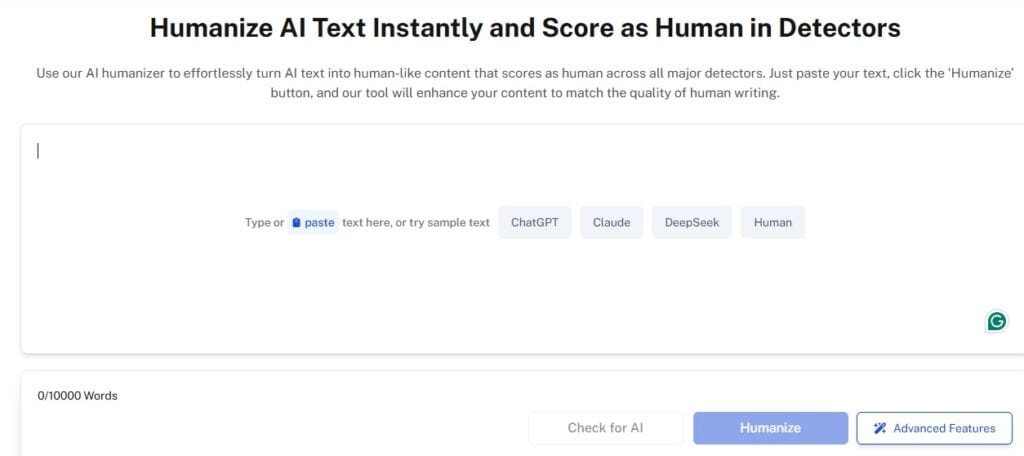
Hva kjennetegner en god blogg?
Du vet kanskje hva en blogg er, men å skrive en god blogg er vanskelig, fordi det ikke finnes noen fast formel for det.
Noen blogger blir virale med ett ærlig innlegg, mens andre stille og rolig bygger opp en lojal leserskare gjennom årene.
De gode der ute har imidlertid noen fellestrekk.
- En klar stemme
Gode blogger høres ut som noen som snakker. Kast utkastet hvis det høres robotaktig ut. Det er stemmen din som får leserne til å bli. Hvis leserne føler at de kjenner deg litt bedre etter å ha lest innlegget ditt, gjør du det riktig.
For å sikre at innholdet ditt er relaterbart og skaper en dyp forbindelse, må du lage sterke, menneskelige narrative kroker til introduksjonene dine.
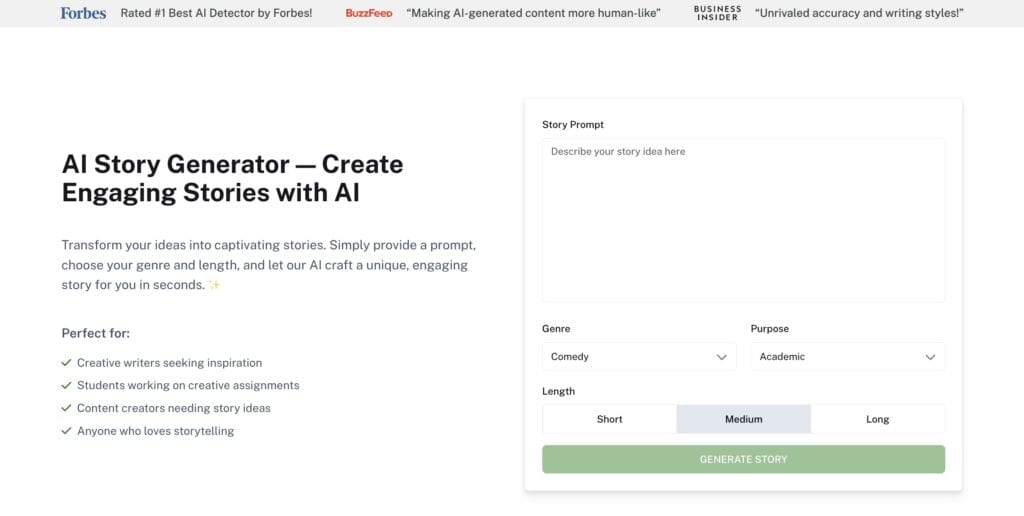
Du kan bruke vår Uoppdagelige AI Historiegenerator når du forklarer hvordan du kan lage relaterbart, menneskelig narrativt innhold til innledningen av en bloggpost som umiddelbart fanger leserens interesse.
- Konsistens
Når jeg sier konsistens, mener jeg ikke at du må poste hver dag. Jeg mener at du må være stabil og ekte. Tonfallet ditt, temaene dine og til og med designet ditt bør gi inntrykk av at de tilhører samme person.
- Verdi
Folk leser blogger for å få noe ut av dem. Du trenger ikke å finne opp hjulet på nytt, men du bør tilby verdi. Autentisitet leses alltid bedre enn perfeksjon.
- Enkelhet
Du kan ha verdens beste tekster, men hvis bloggen din er rotete eller forvirrende, vil leserne forlate den. Et rent layout, lesbar skrift og enkel navigering gjør hele forskjellen.
Sørg også for at overskriftene dine er fengende for å tiltrekke lesere. Jeg bruker Undetectable AI's Tittelgenerator for denne jobben.
Dette verktøyet foreslår alltid titler som gir bloggene mine mange klikk og delinger.
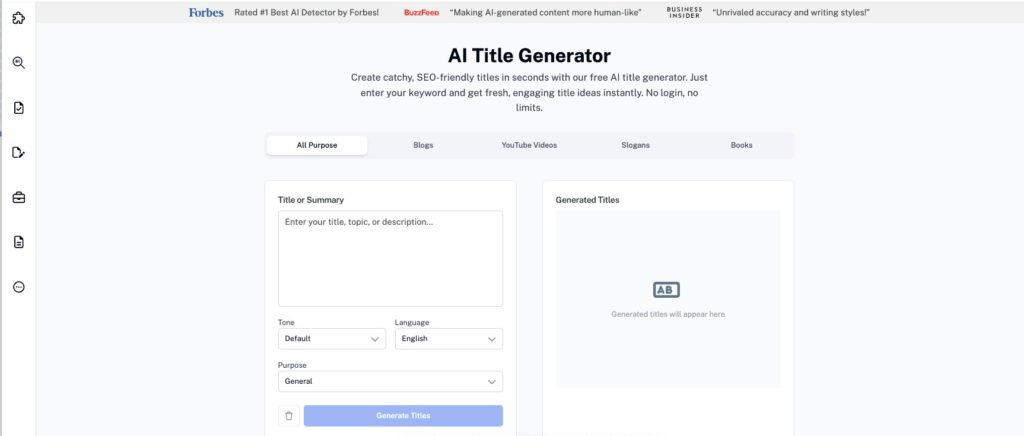
Hvordan blogger tjener penger
Du kan absolutt tjene en passiv inntekt med blogging. Men det skjer ikke over natten.
Blogger tjener penger når leserne stoler på det du deler og kommer tilbake for å lese mer.
Når du har bygget opp tillit og trafikk, finnes det noen gode måter å gjøre bloggen din til en inntektskilde.
- Reklame
Når bloggen din begynner å få faste besøkende, kan du vise annonser ved hjelp av plattformer som Google AdSense. Hver gang noen ser eller klikker på disse annonsene, tjener du et lite beløp.
- Affiliatemarkedsføring
Affiliate-lenker er måten mange profesjonelle bloggere tjener en stabil inntekt på.
Du anbefaler produkter eller tjenester du virkelig bruker, og når noen kjøper via lenken din, tjener du provisjon.
(Tips: Bruk ikke-detekterbar AI AI SEO-skribent for disse bloggene. Den kan optimalisere blogginnleggene dine slik at de riktige personene faktisk finner dem, dvs. de som kan være interessert i de samme produktene.)
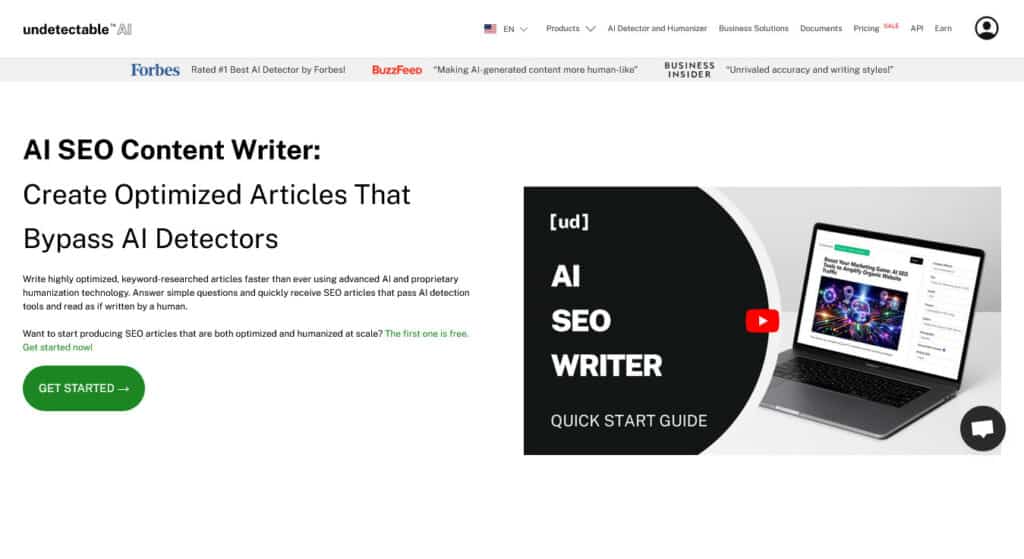
- Sponset innhold
Når bloggen din har fått en anstendig følgerskare, kan merkevarer begynne å kontakte deg for å skrive innlegg om produktene eller tjenestene deres. Dette kalles sponsede innlegg, og de kan gi ganske god betaling.
- Medlemskap eller abonnementer
Denne modellen fungerer godt for skribenter som jevnlig deler verdifullt eller eksklusivt innhold. Tenk på det som en “medlemsdel” av bloggen din.
Leserne betaler en liten månedlig avgift for tilgang til bonusinnlegg, ressurser eller til og med et fellesskap.
Før publisering kan du også bruke vår AI-sjekker for å verifisere om det grunnleggende innholdet i bloggen din ble skrevet av AI.
Det bidrar til å sikre at teksten din forblir autentisk, original og tro mot din egen stemme.
Sjekk innholdet ditt ved hjelp av AI-detektoren og Humanizer nedenfor!
Konklusjon
Vi går oss vill i algoritmer, grammatikk og nøkkelord. Vi glemmer hva en blogg egentlig handler om.
Den kobler deg sammen med mennesker som er i samme situasjon som deg.
Det gode med det er at du ikke trenger å være ekspert for å begynne å blogge. Hvis du har noe å si og tålmodigheten til å være konsekvent, vil publikummet ditt finne deg.
Og ja, verktøy hjelper. Ikke påvisbar AI tilbyr flere verktøy som kan gjøre blogging enklere og mer tidseffektivt for deg.
